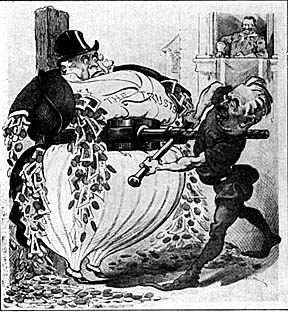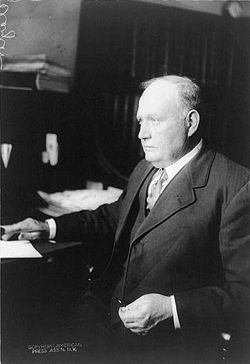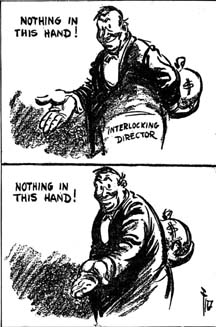 One of the things we have tried to teach readers over the last few years is how important it is to follow the money trail when encountering a group, politician, or researcher counter-intuitively arguing “up is down” or “right is left.” So when a business columnist in the Press of Atlantic City slammed rural broadband as a service provided “to a group of people who mostly don’t want it,” we started digging:
One of the things we have tried to teach readers over the last few years is how important it is to follow the money trail when encountering a group, politician, or researcher counter-intuitively arguing “up is down” or “right is left.” So when a business columnist in the Press of Atlantic City slammed rural broadband as a service provided “to a group of people who mostly don’t want it,” we started digging:
The FCC claims this effort will give 7 million rural people reliable access to high-speed Internet connections. So the hundreds of millions of urban and suburban Americans who wish their Internet was faster and more reliable will pay for 2 percent of us to get just that.
Or maybe we’ll be paying for redundant, overpriced telecom work by companies that donate to rural politicians.
Federal stimulus spending in response to the recession already included $7.2 billion for this same purpose. An analysis by Navigant Economics of three big projects under that Broadband Initiatives Program found:
Even “areas in which very high proportions of households were already served by multiple existing broadband providers” were eligible for subsidized broadband work.
The author’s suspicion that money was involved in all this was correct, but he completely missed who was boarding the money train.
Navigant Economics, the “research group” that produced the inflammatory report slamming rural broadband funding, happens to count AT&T as one of its important clients.
The group, a subsidiary of Navigant Consulting, provides economic and financial analysis of legal and business issues to law firms, corporations and government agencies.
In fact, Navigant pitches its services to a range of corporate clients:
Navigant Economics provides economic analysis in litigation and regulatory proceedings involving competition issues. Our experts have provided testimony in proceedings before District Courts, the Department of Justice, the Federal Trade Commission, the Federal Communications Commission, the Federal Energy Regulatory Commission, and numerous state Public Utilities Commissions.
We provide economic analysis and testimony in connection with mergers and acquisitions and antitrust claims of:
- Anticompetitive horizontal agreements (price fixing, bid rigging, potential anticompetitive effects of joint ventures)
- Unilateral conduct (predatory pricing, refusals to deal, monopolization via patent fraud)
- Vertical restraints (exclusive dealing, requirement contracting, tying and bundling)
We also offer economic analysis and testimony on issues of price and rate of return regulation, mandatory access, quality of service, and benefit-cost analysis, with especial expertise in regulatory proceedings involving communications and the Internet (software and hardware sectors, network unbundling and “net neutrality” issues affecting telecom and cable firms, retransmission consent and other content-related issues, and the range of wireless spectrum issues) and all types of energy markets.
The result is what critics refer to as “dollar a holler research” — bought-and-paid-for-results that coincidentally fit the framework of a client’s public policy agenda. In this case, AT&T (among other phone companies) has fretted about broadband stimulus funding ever since the Obama Administration made it clear the industry would not collectively control the program or reward themselves at taxpayer expense. In addition to criticizing the decision-making process, phone and cable companies have objected to numerous applicants who applied for grants to build networks serving communities those companies have ignored or under-served for years.
To say AT&T has no vested interest in the outcome of rural broadband would be the first major understatement of 2012.
Martyn Roetter with MFR Consulting said Navigant was giving a bad name to researchers.
“Navigant Economics as well as other economists in academia and the consulting profession seem increasingly prepared to support arguments in favor of their clients’ desires and goals regardless of whether they are reasonable or preposterous,” Roetter wrote. “Unfortunately this behavior tends to blur the distinction between (a) respectable advocacy with findings based on evidence and rational arguments and (b) indefensible nonsense, discrediting both academics and consultants.”
Navigant spent much of 2011 trying to convince regulators and the public that T-Mobile actually doesn’t compete with AT&T, so there should be no problem letting the two companies merge. Readers win no prizes guessing who paid for that stunner of a conclusion. Thankfully, the Department of Justice quickly dismissed that notion as a whole lot of hooey.
Navigant’s second ludicrous conclusion is that there is no rural broadband availability problem. Navigant has a love affair with slow speed, spotty DSL (sold by AT&T) and heavily-capped 3G wireless (also sold by AT&T) as the Frankincense and Myrrh of rural Internet life. With those, you don’t need any broadband expansion (particularly from a third party interloper).
“The notion that a nominal maximum speed in a shared radio access network is comparable to a nominal maximum speed of a fixed broadband line to a location is a striking example of ignorance, wilful or otherwise, of the very different operating characteristics and capabilities of these two transmission media,” Roetter soberly observed.
But he knows better.
Kevin Post, columnist for the Press of Atlantic City, bought Navigant’s conclusions hook, line, and sinker and repeated them in the press. In fact, he upped the ante parroting the time-honored provider argument that rural America doesn’t need 21st century broadband because, well, they just don’t want it:
This costly effort is aimed at bringing broadband to a group of people who mostly don’t want it, according to a 2010 Pew Internet survey.
Half of Americans who don’t use the Internet told Pew that the main reason is they don’t find it relevant to their lives.
Only one in 10 nonusers said they would be interested in starting to use the Internet sometime in the future.
Actually, the Pew Internet survey came well before Navigant’s outlandish conclusions, and didn’t directly address the rural broadband availability problem. Instead, Pew was looking at broadband adoption rates, primarily in places that already have one or more broadband providers. Pew found what providers have already realized themselves: broadband growth and adoption is slowing; everyone who wants the service in urban America already has it or wants it. Those that don’t are typically older and lack computers or are too poor to afford the asking price.
Post’s suggestion that a Pew Study concluded rural America does not want broadband service is an exercise in fixing the facts.
That’s the magic of the Dollar-a-Holler Echo Machine. Big telecom companies hire public policy consultants and researchers to find their way to “scientific” evidence proving their corporate agenda, and then feeds the “facts” and “research” to receptive reporters, astroturf “consumer groups,” and politicians to bolster their case. It’s not AT&T suggesting there is no rural broadband problem — it’s Navigant Economics.
As Roetter writes, “A basic knowledge of wireless markets exposes the […] indefensible nature of the positions outlined above. A policy based on ‘tell me what you want to hear, pay me, and I will reproduce it all regardless of its merits’ is a disservice to professionals who try to remain objective and independent, i.e. professional.”


 Subscribe
Subscribe









